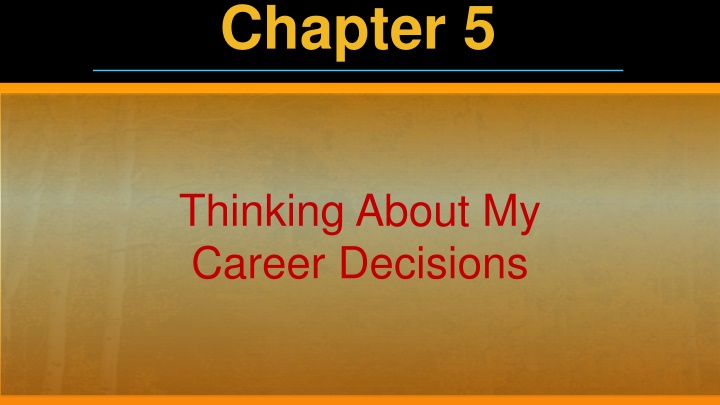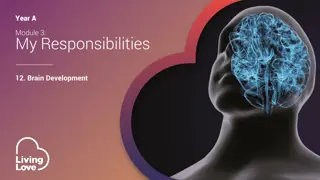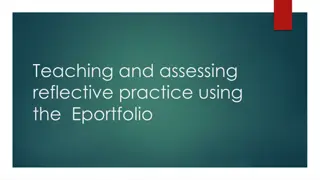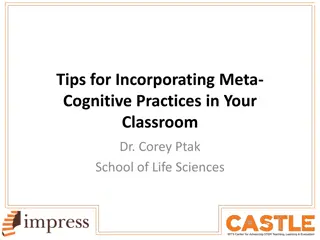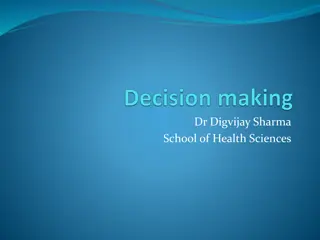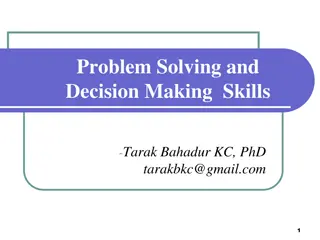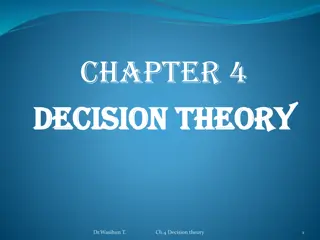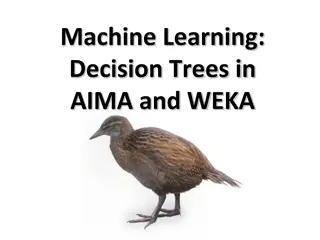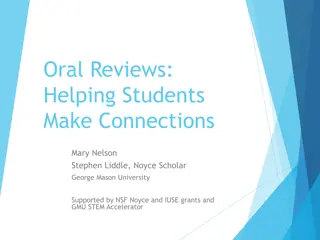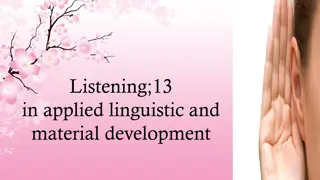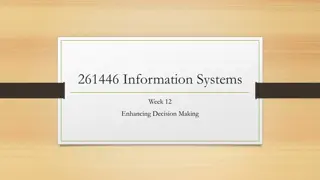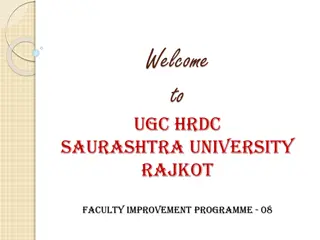Enhancing Decision-Making with Metacognitive Skills
Explore the impact of information overload on decision-making and learn how metacognitive skills such as self-talk, self-awareness, and monitoring can improve your career decisions. Discover strategies to combat negative self-talk and enhance your metacognitive abilities for better outcomes.
Uploaded on Oct 05, 2024 | 0 Views
Download Presentation

Please find below an Image/Link to download the presentation.
The content on the website is provided AS IS for your information and personal use only. It may not be sold, licensed, or shared on other websites without obtaining consent from the author.If you encounter any issues during the download, it is possible that the publisher has removed the file from their server.
You are allowed to download the files provided on this website for personal or commercial use, subject to the condition that they are used lawfully. All files are the property of their respective owners.
The content on the website is provided AS IS for your information and personal use only. It may not be sold, licensed, or shared on other websites without obtaining consent from the author.
E N D
Presentation Transcript
Chapter 5 Thinking About My Career Decisions
Pyramid of Information Processing EXECUTIVE PROCESSING DOMAIN
Information Overload Begley (2011) described information fatigue quantity and rate of information flooding How does this affect decision-making? CIP can help with decision-making in general and career decisions in particular
Executive Processing Domain Metacognitive Skills Skills used to help us THINK about how we make decisions Types of Skills Self-talk Self-awareness Monitoring & control
Metacognitive Skills Self-Talk Think of yourself as COMPETENT and CAPABLE Creates a POSITIVE self-image Reinforces POSITIVE behavior
Negative Self Talk Creates noise inside our heads I ll never be able to find the right major for me. Can you Can you think of other think of other examples? examples? I can t find any employers who will hire me with my GPA.
Metacognitive Skills Self-Awareness Being aware of yourself during the process by attending to: Physiological signs: headache Emotions & feelings: anxiety Interests of self & significant others
Metacognitive Skills Monitoring & control: Knowing when to go ahead Knowing when to get more information Balance between compulsivity & impulsivity
What Are Metacognitive Skills? Knowing when to get additional help Being aware of effective decision- making strategies Being clear about specific problems that need to be solved Monitoring how process is going Having a positive attitude
Improving Metacognitive Skills 1) Identifying negative thoughts 2) Train for positive self-talk 3) Reducing EITHER/OR thinking 4) Develop self-control 5) Improve general problem solving
Identifying negative thoughts Negative thoughts may be learned or based on popular myths Example: I m afraid I ll pick something & then change my mind. What s negative about this statement? Career Thoughts Inventory (CTI) helps people learn more about how they think about career choices. 4-step process to change negative thoughts: Identify, Challenge, Alter, Act
Train for Positive Self-Talk Work toward eliminating negative statements Learn to start using more positive self-talk Utilize self-help books, career advisors, professional counseling, mindfulness techniques and related experiences How would you challenge the following statement: I m not a good decision maker.
Reducing Either/Or Thinking This kind of thinking can freeze or immobilize us All the good jobs require math. How would this statement affect a person s career decisions?
Developing Self-Control Utilize techniques to help manage factors affect our career problem- solving and decision-making behaviors Examples: Deep breathing to relax before an interview Using calming mental images
Improved General Problem Solving Successful use of strategies, such as the CASVE cycle, can improve metacognitive skills for career decisions Communication Execution Analysis Using the Guide to Good Decision-Making Valuing Synthesis
Negative Self-Talk and Self-Knowledge How we think about our personal characteristics interests, values, skills, e.g., No field of study or occupation interests me. * Reframe: It is possible that I haven t fully determined what my likes and dislikes are. I may need more life- experience to really understand my interests. I can get more life experience from full-time or part-time jobs, volunteer work, or leisure activities.
Negative Self-Talk and Option Knowledge Related to how we think about options in work, education, and leisure...how we group these options in relation to one another. Almost all occupational information is slanted toward making the occupation look good. * Reframe: While it is certainly true that some kinds of occupational information are designed to make the occupation look good, it is likely an overstatement to say this about most information. Occupational information may be biased in both directions, good or bad.
Negative Self-Talk and Decision-Making Related to the career decision-making (CASVE cycle) process I get so depressed about choosing a field of study or occupation that I can t get started. * (What CASVE cycle phase is this?) Reframe: I may need to get help for my feelings or take small concrete steps toward getting the information I need to begin the decision-making process. Such steps might include talking with people in different occupations, reading about occupations, or seeking career assistance to help me develop a plan for taking the next step.
Negative Self-Talk and Executive Processing Deals with the ability to monitor, control, and evaluate all areas of information processing Avoids perfectionism, top-dogging, and external forces I get so anxious when I have to make decisions that I can hardly think. * Reframe: Many people feel anxious when making important decisions, making it harder to think clearly. Yet, avoiding decisions is not a good idea. With help, I can get the information I need and learn how to make a good decision.
Maximizers and Satisficers Dealing with overwhelming number of options in the Internet age Maximizers--choosing the absolute best choice Satisficers--choosing something that is good enough Importance of avoiding perfectionism in decision-making How do these fit with your approach to decision-making? Is one better than the other?
Maximizers and Satisficers I can t think of any fields of study or occupations that would suit me. * The views of important people in my life interfere with choosing a field of study or occupation. * I know what I want to do but I can t develop a plan for getting there. *
Summary Decision-making is an ongoing process, not an event Negative thoughts impede all areas of the Pyramid & CASVE cycle Metacognitive skills can be learned with desire, practice, and action Use all available resources to aid in hanging your thoughts
